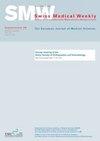Use of complementary medicine and its association with SARS-CoV-2 vaccination during the COVID-19 pandemic: a longitudinal cohort study
IF 2.1
4区 医学
Q2 MEDICINE, GENERAL & INTERNAL
引用次数: 0
Abstract
AIMS OF THE STUDY: Patients are increasingly using and requesting complementary medicine therapies, especially during the COVID-19 pandemic. However, it remains unclear whether they use them in conjunction with conventional medicine or to replace vaccination or other approaches and whether they discuss them with their physicians as part of shared decision-making. This study aimed to evaluate the use and initiation of complementary medicine during the COVID-19 pandemic, focusing on the association between complementary medicine use and COVID-19 vaccination status. METHODS: This study is a part of the longitudinal cohort of the CoviCare program, which follows all outpatients tested for COVID-19 at the Geneva University Hospitals. Outpatients tested for COVID-19 were contacted 12 months after their positive or negative test between April and December 2021. Participants were asked about their vaccination status and if they had used complementary medicine in the past 12 months. Complementary medicine use was defined based on a specific list of therapies from which participants could choose the options they had used. Logistic regression models adjusting for age, sex, education, profession, severe acute respiratory system coronavirus 2 (SARS-CoV-2) infection, and pre-existing conditions were used to evaluate the association between being unvaccinated and complementary medicine use. SARS-CoV-2 infection status was evaluated for effect modification in the association between being unvaccinated and complementary medicine use. RESULTS: This study enrolled 12,246 individuals (participation proportion = 17.7%). Their mean age was 42.8 years, 59.4% were women, and 63.7% used complementary medicine. Complementary medicine use was higher in women, the middle-aged, and those with a higher education level, a SARS-CoV-2 infection, or pre-existing comorbidities. A third of cases initiated complementary medicine therapies as prevention against COVID-19. Being unvaccinated was associated with complementary medicine use (adjusted odds ratio [aOR] 1.22 [1.09–1.37]), and more specifically when these therapies were used for COVID-19 prevention (aOR 1.61 [1.22–2.12]). Being unvaccinated was associated with the use of zinc (aOR 2.25 [1.98–2.55]), vitamin D (aOR 1.45 [1.30–1.62]), and vitamin C (aOR 1.59 [1.42–1.78]), and more specifically when these therapies were used for COVID-19 prevention. Only 4% of participants discussed using complementary medicine with their primary care physicians. CONCLUSION: While complementary medicine is increasingly used, it is rarely discussed with primary care physicians. Complementary medicine use, especially for COVID-19 prevention, is associated with COVID-19 vaccination status. Communication between physicians, patients, and complementary medicine therapists is encouraged to facilitate a truly holistic approach to making a shared decision based on the best available information.COVID-19大流行期间辅助药物的使用及其与SARS-CoV-2疫苗接种的关系:纵向队列研究
研究目的:患者越来越多地使用和要求补充医学疗法,尤其是在 COVID-19 大流行期间。然而,目前仍不清楚他们是在使用常规药物的同时使用辅助药物,还是用辅助药物取代疫苗接种或其他方法,以及他们是否与医生讨论过辅助药物,并将其作为共同决策的一部分。本研究旨在评估 COVID-19 大流行期间补充医学的使用和启动情况,重点关注补充医学的使用与 COVID-19 疫苗接种情况之间的关联。方法:本研究是 CoviCare 计划纵向队列的一部分,该计划跟踪所有在日内瓦大学医院接受 COVID-19 检测的门诊患者。在 2021 年 4 月至 12 月期间,COVID-19 检测结果呈阳性或阴性的门诊患者在检测结果呈阳性或阴性的 12 个月后接受了联系。他们被问及疫苗接种情况以及在过去 12 个月中是否使用过补充药物。补充医学的使用是根据一个特定的疗法列表来定义的,参与者可以从中选择他们使用过的疗法。使用调整了年龄、性别、教育程度、职业、严重急性呼吸系统冠状病毒 2(SARS-CoV-2)感染情况和原有疾病的逻辑回归模型来评估未接种疫苗与使用辅助药物之间的关系。还评估了 SARS-CoV-2 感染状况对未接种疫苗与使用辅助药物之间关系的影响。结果:这项研究共招募了 12246 人(参与比例 = 17.7%)。他们的平均年龄为 42.8 岁,59.4% 为女性,63.7% 使用辅助药物。女性、中年人、教育程度较高者、SARS-CoV-2感染者或原有合并症患者使用辅助药物的比例较高。三分之一的病例开始使用辅助药物疗法来预防 COVID-19。未接种疫苗与使用辅助药物有关(调整后的几率比[aOR] 1.22 [1.09-1.37]),尤其是当这些疗法用于预防 COVID-19 时(aOR 1.61 [1.22-2.12])。未接种疫苗与锌(aOR 2.25 [1.98-2.55])、维生素 D(aOR 1.45 [1.30-1.62])和维生素 C(aOR 1.59 [1.42-1.78])的使用有关,尤其是当这些疗法被用于预防 COVID-19 时。只有 4% 的参与者与他们的主治医生讨论过使用辅助药物的问题。结论:虽然补充医学的使用越来越多,但却很少与初级保健医生讨论。使用补充药物,尤其是用于预防 COVID-19 的补充药物,与 COVID-19 疫苗接种情况有关。我们鼓励医生、患者和辅助药物治疗师之间进行沟通,以促进真正的整体方法,在现有最佳信息的基础上共同做出决定。
本文章由计算机程序翻译,如有差异,请以英文原文为准。
求助全文
约1分钟内获得全文
求助全文
来源期刊

Swiss medical weekly
医学-医学:内科
CiteScore
5.00
自引率
0.00%
发文量
0
审稿时长
3-8 weeks
期刊介绍:
The Swiss Medical Weekly accepts for consideration original and review articles from all fields of medicine. The quality of SMW publications is guaranteed by a consistent policy of rigorous single-blind peer review. All editorial decisions are made by research-active academics.
 求助内容:
求助内容: 应助结果提醒方式:
应助结果提醒方式:


